Staff Reflections
Confronting Conflict with Humanity and Hope
How we’re leaning into humanitarian principles to make a difference in the Israel-Gaza crisis.
Lately, I’ve been getting questions from my family and friends about the ongoing conflict in Gaza. I know it can feel overwhelming, confusing, and downright heartbreaking. The scars of the Hamas attacks on Israeli farming communities last October are still fresh, innocent people have died in large numbers, and the war drags on with no end in sight. But amidst the chaos, your generosity has helped World Relief make an impact.
World Relief has directly supported many organizations on the ground. We’ve provided aid within Gaza, on the border in Egypt, and to Israelis and Palestinians on the West Bank. Here’s just a glimpse of what has been possible:
- Medicines and Medical Supplies: Over 50,000 people have received medicines, medical supplies or lifesaving healthcare.
- Water and Sanitation: We’ve provided latrines and water filtration systems to meet the needs of internally displaced people.
- Food and Basic Necessities: Countless families have received the essentials to survive this brutal war.
Of course, these conversations often come around to the hard questions. “What’s really happening?” and “What do you think?” In crises like this, there are so many conflicting reports and strong opinions on all sides. There are powerful forces at play with hardline agendas, but there are also humanitarians, like World Relief and our partners, working tirelessly to value and uphold the sanctity of every human life amidst the turmoil.
Humanitarians engage in these conflicts driven by a shared set of principles: humanity, impartiality, neutrality, and independence. These aren’t just words to us; they’re the very foundation of our work. This means we believe in:
- Humanity: Protecting life, health, and ensuring respect for all human beings; do no harm.
- Impartiality: Aid based solely on need, prioritizing the most urgent needs first.
- Neutrality: Addressing human suffering wherever it’s found, without taking sides.
- Independence: Humanitarian aid and action must be autonomous from political, economic, military, or other objectives that any actor holds.
There are several ways I invite my family and friends and the broader World Relief community to embrace these values. First, you can look for God in the face of those who suffer. Jesus taught us that when we serve those in need, we’re serving him (Matthew 25:40-45). All human beings are created in the image of God. This is the bedrock of humanity as a value, and the reason why we do whatever we can to protect life and health in conflict settings.
Second, you can acknowledge suffering and needs do not discriminate in a conflict. In your conversations, note suffering that happens to anyone, especially to those with whom you disagree.
Third, you can give. Even a few dollars might provide bandages for a wound, safe shelter, or emergency transportation.
Fourth, you can advocate for safe corridors for humanitarian aid. Delivering lifesaving aid in conflict zones like Gaza is incredibly challenging. Aid workers lives have been lost (some targeted and some due to the general lack of protection for civilians), barriers to aid have been erected, and the combined loss of life and damage to infrastructure has gravely hit even the most basic of services. Safe corridors for delivering aid are crucial, and we need those in power to commit to providing them.
Lastly, and most importantly, you can pray. While we may not have the power to change everything, your prayers are vital. They make a real difference. Your prayers join with the Holy Spirit, who works with the same power that raised Christ from the dead (Romans 8:26-27). It’s this faith and hope that keep me going, knowing that God is greater than anything that stands against us (Romans 8:31).
Your alignment with us in values, in conversations, in giving, in advocacy, and in prayer is a beacon of hope. Together, we can still make a difference in the face of this heartbreaking conflict, one act of generosity and love at a time.
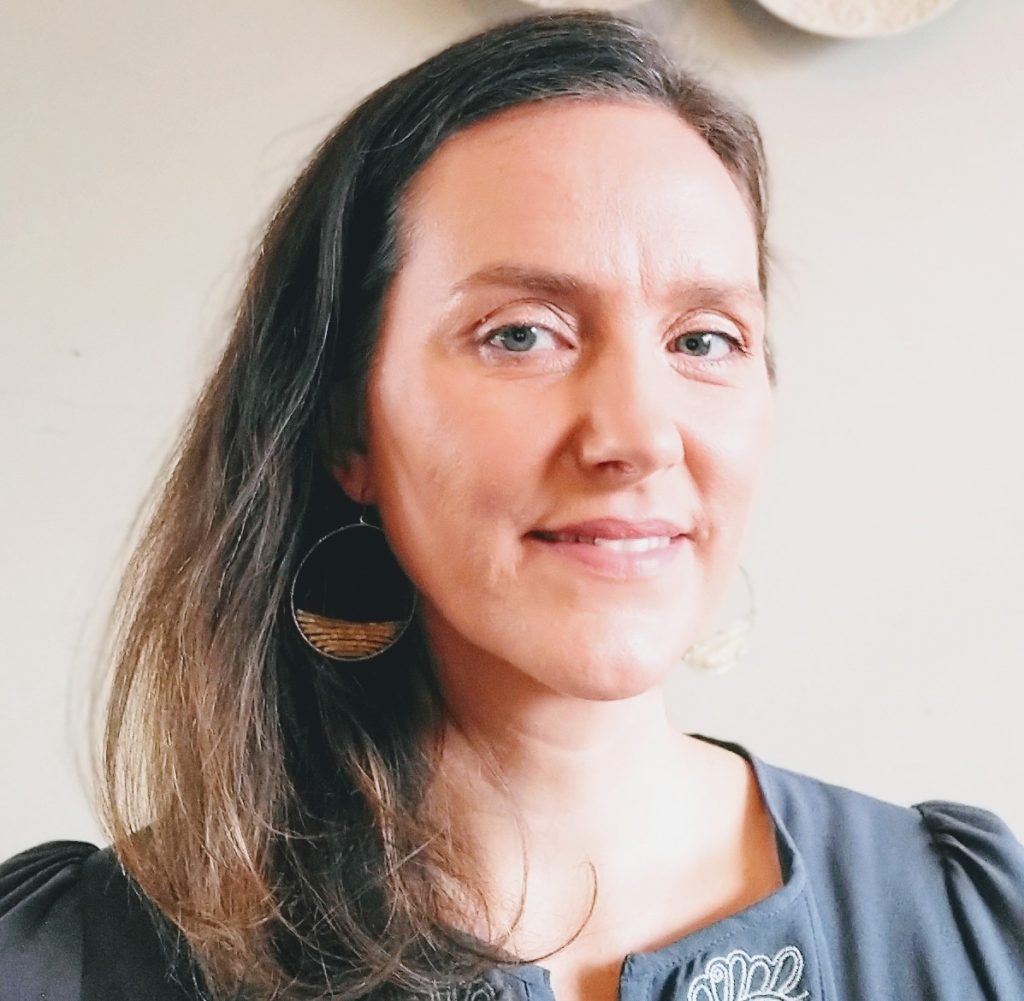
Emily Chambers Sharpe is the Director for Health, Nutrition, and WASH in World Relief’s International Programs Department. She has held various senior management and technical roles in humanitarian health and nutrition and community-based HIV programs. She has many years of experience with health and nutrition programs in conflict settings in Sudan and throughout the Middle East. Emily earned her MPH from Boston University School of Public Health. She lives in Charlotte, NC with her husband Rob and their three sons.
The Power of Perspective in Relationships
Every relationship you have holds the potential to change you. And when you grow your perspective to understand the experiences, thoughts, and values of others, those relationships hold the power to help change a community.
I’ve had many relationships throughout the years that have guided, challenged, encouraged, and shaped my life. And I’m sure you could list the names of several people who did the same for you. But it was one relationship that significantly impacted the trajectory of my life because it opened my understanding of the world and the people in it.
During high school, I was blessed to meet another young woman my age, an exchange student from Croatia. We got to know each other and became friends. One day I learned that her living situation was falling apart. She faced the blunt reality of being forced to move to another town and start over. Because our friendship had become an important part of my life, I felt compelled to do something. I proposed the idea to my parents that my friend move in with us.
I would like to think it was my persuasive skills that made them say yes. Rather, their openness was rooted in their love for God and for others – core tenants of our Christian faith. They welcomed her with open arms. Before long, I was sharing the master bedroom with my new friend who truly became like a sister to me for the rest of that school year.
“When your perspective is given the space to grow, it has the power to change you.”
We became friends for the same reasons most friendships begin: sharing interests and spending time together. We didn’t enter into a friendship with the intention that we would grow or change from it. But through the ebb and flow of our shared experiences, it naturally became mutually transformative.
Our friendship helped me become more of the person God invited me to be. She grew my perspective – and by doing so, I began to change into someone who values differences and wants to welcome others. My understanding that we are all beautifully made in the image of God, brimming with life and potential, continues to inspire me to this day in the work God has called me to do.
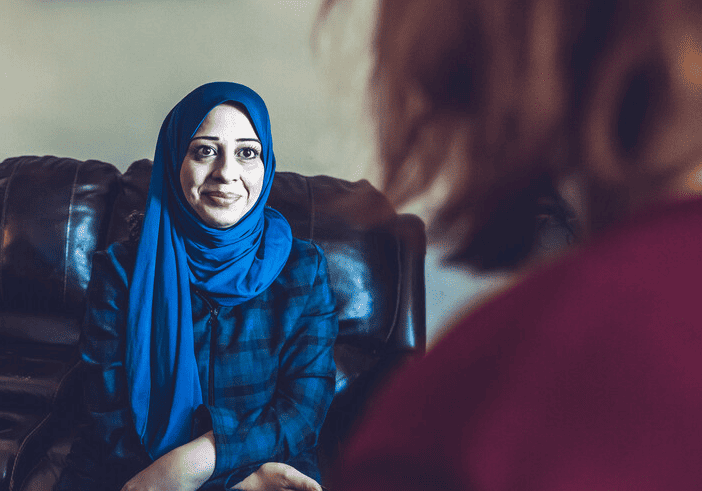
“Your perspective grows in the context of relationship and by your proximity to the stories of others.”
In my role at World Relief, I regularly get to listen to and learn from our refugee and immigrant neighbors. As we celebrate Refugee Awareness Month and World Refugee Day on June 20th, two World Relief staff members who came to the United States as refugees offered to briefly share their experiences. I believe listening to their stories – and other refugees’ stories like them – helps to broaden our perspective on the true impact that occurs when we choose to walk alongside our refugee neighbors as they rebuild their lives.
I celebrate these friends and the thousands of other refugees who have found themselves rebuilding a life in the wake of tragedy.
Every year millions of people are forced to leave their homes for hundreds of reasons and become refugees. Whether they’ve been persecuted because of their faith, their nationality, their gender or sexuality, or experienced extreme poverty or political oppression, they still bear the image of God. In spite of the story playing out in their lives at that particular time, their worth remains. We get to become a part of that story as they rebuild their lives in the U.S., and in so doing, discover how the image of God is alive in us as well.
“Your perspective grows when it becomes intentional.”
As I look back on my high school years, I’m so grateful for my parents’ willingness to listen to my friend’s story. They stepped out in faith and moved closer to her, choosing to do something they hadn’t done before by giving her a place in our home.
Their decision reflected an important truth about growing your perspective to build mutually transformative relationships. It takes intention to move out of your comfort zone into spaces where people are different from you. It’s in these spaces where you grow, learn, and transform. Yes, it can happen by accident, but it almost always requires a deliberate effort.
During this Refugee Awareness Month, let’s be people who are intentional. Let’s be people who celebrate our refugee neighbors. And let’s be people who celebrate and welcome those around us the way that God celebrates and welcomes us.
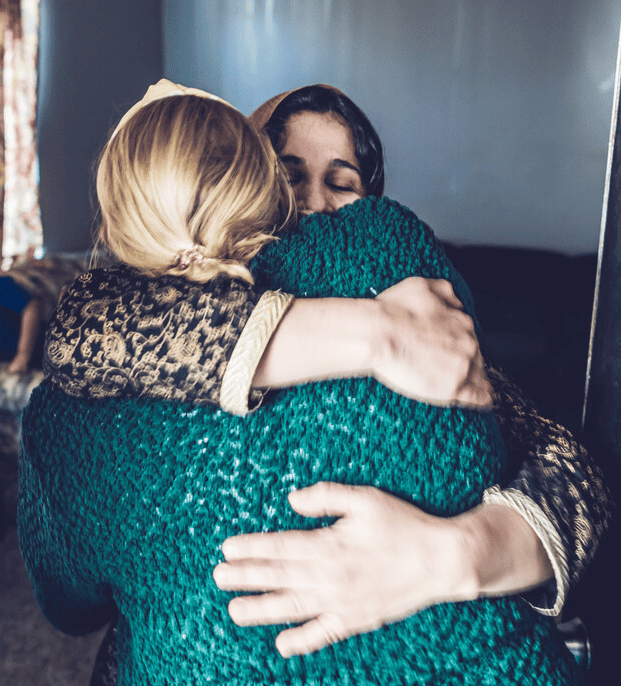
The Part You Play
By the end of September, World Relief Chicagoland expects to resettle over 400 refugees from all over the world and people like you have a part to play every step of the way. Through volunteering, donating needed items, or giving financially you can be a part of something greater, a truly welcoming community. To learn more about how to show welcome and celebrate Refugee Awareness Month, visit World Refugee Day 2023 – World Relief
Social Emotional Learning Equips Refugee Children and Their Families to Thrive
At World Relief, we are committed to advocating for refugees the opportunity to legally seek refuge in the United States. But our work doesn’t end there. We know that serving the refugee community requires caring for the whole person and their families.
As part of our bold vision to move Forward Together, we are determined to Go Deeper in our care for our refugee and other immigrant neighbors by addressing root causes of vulnerability and expanding our expertise in mental health.
Carrie Woodward, Foundations Partnerships Manager for World Relief Chicagoland, breaks down one of the trauma-informed mental health strategies: Social Emotional Learning.
At just four years old, Sam arrived in the United States with his family. Upon arrival, they were welcomed by World Relief Chicagoland. Like other refugees, the family arrived with hope and dreams for their future. the chance to rebuild in the United States did not erase the impact left by tragedy and trauma — even for a young child like Sam.
Refugee children carry their complex emotions and traumatic histories with them. This can make getting to a place of stability and happiness very challenging.
Even after coming to the U.S. Sam’s body and mind were marked by the trauma of his past, and he struggled to adjust. He had a lot of emotions that he did not understand or know how to express – so he lashed out in frustration. This left his parents feeling exhausted and overwhelmed, unsure of what to do. His mother told World Relief, “I feel helpless.”
The Challenges Refugee Children and Youth Face
For children, whose brains are still developing, the resettlement experience itself can be retraumatizing as they encounter language barriers, difficulty navigating community resources, lack of relational support and culture shock. Many refugees come from cultures where discussing mental health is taboo. This often means that busy parents like Sam’s who are processing their own trauma may not know how to support their children in recovering too.
Thankfully, with the help of community partners and volunteers, World Relief Chicagoland is equipping parents and children to grow and thrive through Social Emotional Learning (SEL).
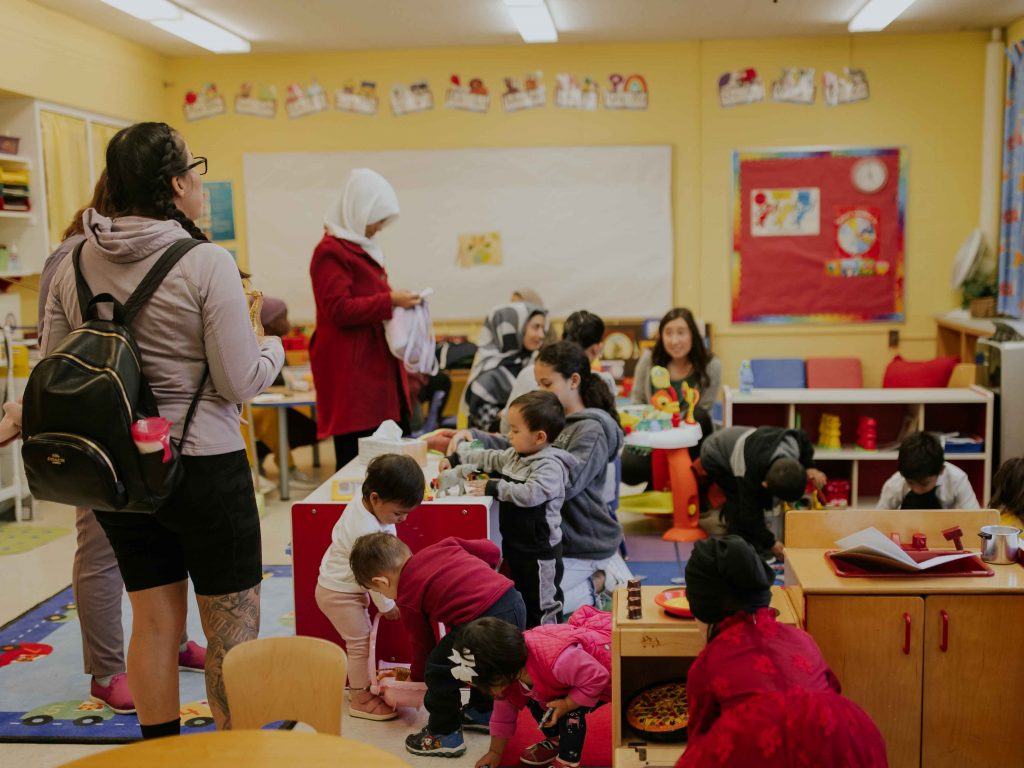
How Social Emotional Learning Changes Children’s Lives
Refugee children have often experienced chronic stress for months or even years at a time. Their stories are often marked with violence, poverty, death of loved ones and displacement. These factors create complex thoughts and feelings that can feel scary to explore. Yet, processing these emotions is key to moving forward.
Social Emotional Learning helps children process by focusing on five areas that impact every aspect of life: self-awareness, self-management, responsible decision-making, relationship skills, and social awareness.
Each of these areas impacts a child’s self-confidence, relationships and ability to cope with daily stressors. Research has shown that when compared to students who did not participate in SEL, those who engaged with SEL activities:
- Had better grades
- Showed more skills for managing anxiety and depression
- Behaved better in a classroom setting
- Expressed better attitudes towards themselves and others
These impacts have long-term, positive effects. One analysis showed that students who participated in SEL programs gained social emotional skills that led to higher levels of well-being 18 years later.
What Does SEL Look Like At World Relief?
World Relief Chicagoland incorporates SEL into age-appropriate activities such as:
- 10-minute guided check-ins to identify and reflect on how their bodies are feeling
- Writing, drawing, or speaking “I am” statements. Saying affirmations like “I am good at basketball!” or “I am a great big sister!” can build self-confidence
- Using a chart of expressive emojis to help preschoolers identify and describe feelings
- Coloring pictures in response to prompts like “Show us your family” or “Show your home
SEL is part of a holistic approach to mental health that addresses the specific emotional needs of immigrant and refugee youth.
“Equipping refugee children with the tools and treatment they need to adapt and grow through trauma forges a pathway for them to embrace emotion and learn how to process it in a way that feels safe and organic to their developmental level,” said Katie Schnizlein, Early Childhood Program Coordinator at World Relief Chicagoland. “This breaks down the barriers of layered emotion and devastating trauma…as they grow into the rest of life.”
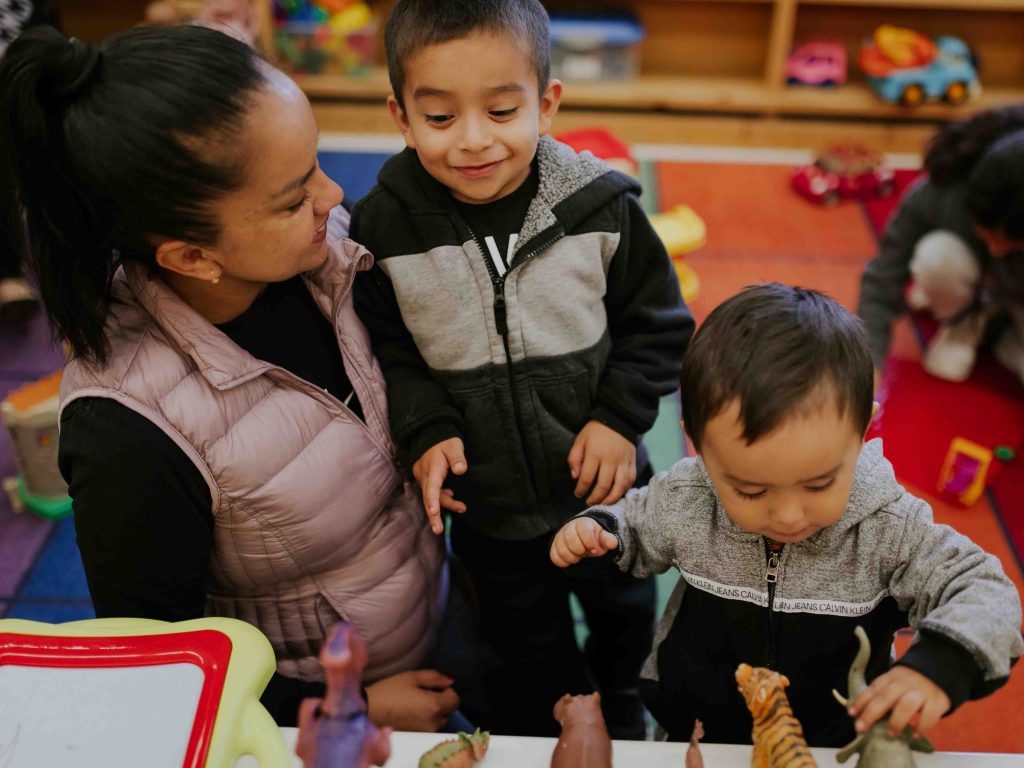
Preparing Children for Life
Ultimately, Katie says, “SEL ensures that children have services that cover mind, body and soul. Through SEL, children have the ability to grow in agency, autonomy, self-awareness, emotional regulation and the art of fitting into the world around them.”
In Sam’s case, SEL is part of the answer to the pain and the helplessness his parents felt.
Shortly after they arrived, Sam started attending a preschool and participating in World Relief’s Children & Youth program. He gained structure and relational support through his tutor and SEL activities, while his mother joined a World Relief-facilitated parenting group where she learned strategies to support her son socially and emotionally.
Thanks to this support system, now at five years old, Sam plays well with friends, is learning quickly in school and is working on naming and describing his emotions.
Make a Difference. Get Involved.
Volunteers in our Children and Youth program play an essential role in providing the relational and educational support refugee children need as they rebuild their lives. As an early childhood volunteer, youth tutor, or a summer club group leader, you can help make a difference.
Read more about the impact happening among children and youth:
How to Have Impact as a Volunteer Tutor
Summer Camp: Fun, Fellowship and First Responders
How Refugee Children Reshape Resettlement for Their Families

Carrie Woodward joined World Relief in 2021 in a role that engages foundation and business partners throughout the Chicago area. She studied community development and history at Covenant College. Her education informs her passion for asking questions and a desire to find evidence-based ways to help communities flourish. Prior to coming to World Relief, Carrie worked for an international development organization and an academic research lab in Arizona. She is an avid reader, podcast-listener and loves exploring Chicago’s many unique neighborhoods, playing pickleball and walking by Lake Michigan.
Social Emotional Learning Equips Refugee Children and Their Families to Thrive
At World Relief, we are committed to advocating for refugees the opportunity to legally seek refuge in the United States. But our work doesn’t end there. We know that serving the refugee community requires caring for the whole person and their families.
As part of our bold vision to move Forward Together, we are determined to Go Deeper in our care for our refugee and other immigrant neighbors by addressing root causes of vulnerability and expanding our expertise in mental health.
Carrie Woodward, Foundations Partnerships Manager for World Relief Chicagoland, breaks down one of the trauma-informed mental health strategies: Social Emotional Learning.
At just four years old, Sam arrived in the United States with his family. Upon arrival, they were welcomed by World Relief Chicagoland. Like other refugees, the family arrived with hope and dreams for their future. the chance to rebuild in the United States did not erase the impact left by tragedy and trauma — even for a young child like Sam.
Refugee children carry their complex emotions and traumatic histories with them. This can make getting to a place of stability and happiness very challenging.
Even after coming to the U.S. Sam’s body and mind were marked by the trauma of his past, and he struggled to adjust. He had a lot of emotions that he did not understand or know how to express – so he lashed out in frustration. This left his parents feeling exhausted and overwhelmed, unsure of what to do. His mother told World Relief, “I feel helpless.”
The Challenges Refugee Children and Youth Face
For children, whose brains are still developing, the resettlement experience itself can be retraumatizing as they encounter language barriers, difficulty navigating community resources, lack of relational support and culture shock. Many refugees come from cultures where discussing mental health is taboo. This often means that busy parents like Sam’s who are processing their own trauma may not know how to support their children in recovering too.
Thankfully, with the help of community partners and volunteers, World Relief Chicagoland is equipping parents and children to grow and thrive through Social Emotional Learning (SEL).

How Social Emotional Learning Changes Children’s Lives
Refugee children have often experienced chronic stress for months or even years at a time. Their stories are often marked with violence, poverty, death of loved ones and displacement. These factors create complex thoughts and feelings that can feel scary to explore. Yet, processing these emotions is key to moving forward.
Social Emotional Learning helps children process by focusing on five areas that impact every aspect of life: self-awareness, self-management, responsible decision-making, relationship skills, and social awareness.
Each of these areas impacts a child’s self-confidence, relationships and ability to cope with daily stressors. Research has shown that when compared to students who did not participate in SEL, those who engaged with SEL activities:
- Had better grades
- Showed more skills for managing anxiety and depression
- Behaved better in a classroom setting
- Expressed better attitudes towards themselves and others
These impacts have long-term, positive effects. One analysis showed that students who participated in SEL programs gained social emotional skills that led to higher levels of well-being 18 years later.
What Does SEL Look Like At World Relief?
World Relief Chicagoland incorporates SEL into age-appropriate activities such as:
- 10-minute guided check-ins to identify and reflect on how their bodies are feeling
- Writing, drawing, or speaking “I am” statements. Saying affirmations like “I am good at basketball!” or “I am a great big sister!” can build self-confidence
- Using a chart of expressive emojis to help preschoolers identify and describe feelings
- Coloring pictures in response to prompts like “Show us your family” or “Show your home
SEL is part of a holistic approach to mental health that addresses the specific emotional needs of immigrant and refugee youth.
“Equipping refugee children with the tools and treatment they need to adapt and grow through trauma forges a pathway for them to embrace emotion and learn how to process it in a way that feels safe and organic to their developmental level,” said Katie Schnizlein, Early Childhood Program Coordinator at World Relief Chicagoland. “This breaks down the barriers of layered emotion and devastating trauma…as they grow into the rest of life.”

Preparing Children for Life
Ultimately, Katie says, “SEL ensures that children have services that cover mind, body and soul. Through SEL, children have the ability to grow in agency, autonomy, self-awareness, emotional regulation and the art of fitting into the world around them.”
In Sam’s case, SEL is part of the answer to the pain and the helplessness his parents felt.
Shortly after they arrived, Sam started attending a preschool and participating in World Relief’s Children & Youth program. He gained structure and relational support through his tutor and SEL activities, while his mother joined a World Relief-facilitated parenting group where she learned strategies to support her son socially and emotionally.
Thanks to this support system, now at five years old, Sam plays well with friends, is learning quickly in school and is working on naming and describing his emotions.
Read more about how we are going further and deeper to create lasting change and helping families thrive. Follow us on Facebook, Instagram or LinkedIn.

Carrie Woodward joined World Relief in 2021 in a role that engages foundation and business partners throughout the Chicago area. She studied community development and history at Covenant College. This education still informs her passion for asking questions and desire to find evidence-based ways to help communities flourish. Prior to coming to World Relief, Carrie worked for an international development organization and an academic research lab in Arizona. She is an avid reader, podcast-listener, and explorer of Chicago’s many unique neighborhoods. You can often find her playing pickleball or walking by Lake Michigan.
7 Ways to Love Your Neighbor
In Rwanda we have a saying — “Ifuni ibagara ubucuti ni akarenge.” This literally means, “a hoe that cultivates friendship is a foot.” In other words, we love our neighbor by visiting them and helping if they need anything.
No matter where you live, loving your neighbor is an integral part of our call as Christians. Having served alongside local churches in Memphis and Rwanda, we have seen first-hand how loving your neighbor comes in all shapes and sizes.
In some places, loving your neighbor might mean sharing baked goods. In another, it may mean dropping by unannounced for an afternoon tea. And still, for others it could mean fetching water or making bricks for a neighbor who is building a house. Yet, no matter where you live, one thing remains the same: We love because God first loved us. That’s why today, we’re sharing 7 Ways to Love Your Neighbor.
1. Take the Initiative and Value Small Acts of Kindness
Helping one another without being asked to do so is part of the culture in Rwanda. And doing something for your neighbor does not always require much. If your neighbor is sick, you could visit them, deliver groceries to them or take them to the doctor when necessary.
In rural Africa, if a neighbor is building a house, you could lend a hand by fetching water for them, making bricks or finding wood. In short, loving your neighbor is in action more than words.
2. Spend time
Quality time is said to be one of the five major ways people experience love. That’s true no matter who you are or where you’re from. When refugee families first arrive in the U.S., many often feel isolated with no family, no community and no means of transportation. Even if there is a language barrier, the simple act of spending time with our neighbors can make a world of difference. Whether you pop in for a tea or a walk, just knowing that someone cares and that they are not alone allows refugee families to feel the love of Christ through our actions.
3. Share a meal
Sharing a meal is perhaps one of the best ways to show our love for our neighbors. Whether it’s at your home or theirs, breaking bread together meets not only a physical need but also the mental and spiritual need for relationship.
No matter where you live, meals are an opportunity to connect, sharing our own culture while experiencing someone else’s. Especially for many refugees rebuilding their lives in the U.S., sharing a meal also demonstrates respect and interest in their life and culture, something that may often be overlooked in their new home.
4. Foster Reconciliation
Loving your neighbor can encompass more than lending a hand. It’s also reconciling relationships. In some Rwandan communities, church members often disregarded people from other denominations, sometimes to the point of viewing them as non-believers and refusing to work together.
After being trained by World Relief, church leaders, volunteers and program participants are reaching across denominational lines to adopt a culture of loving their neighbor by acting together. They’ve realized that together, as a unified body, they can accomplish much more, and they’re seeing ripple effects of love, joy, peace and harmony across whole communities.
Ask yourself — is there someone I can love by moving toward reconciliation and forgiveness? Is there someone I disagree with politically or denominationally that I can build a connection and a friendship with?
5. Listen
Paying close attention and listening to what your neighbors are saying is so important. We may have had very different upbringings and viewpoints, but we are all made in the image of God, and each of us has a story to tell. By listening to that story, we’ll learn new ways in which we can be intentional with our neighbors, showing them that they are welcomed and loved.
6. Advocate
While loving our neighbors on an interpersonal level is who we are called by Christ to be, sometimes systemic injustice is at the root of a problem, and loving our neighbor means advocating with them as well.
Advocacy is speaking up with those who are vulnerable to address the underlying causes of injustice by influencing the policies and practices of people in power. By starting with the reality of “what is,” we can leverage our voices to make systemic changes that lead to a vision of “what should be.”
7. Go Together
At World Relief, we believe we can accomplish so much more when we go together. In the U.S., our church partners form Good Neighbor Teams who work together to welcome and serve their new immigrant neighbors by taking them to appointments, picking up groceries or fostering friendships over lunch or dinner.
In places like Rwanda and Haiti, Outreach Group volunteers pair up to visit the homes of struggling families. Outreach Groups give local churches the opportunity to intentionally engage the community in a consistent way at a wide scale. Ordinary church members are equipped to do what Jesus taught and did — reaching out to their neighbors to share messages that lead to holistic development and facilitate relationships.
If you’re considering reaching out to a neighbor or participating in a service project, why not ask someone to join you, so this movement of love can grow further?
Living justly and loving our neighbor is better when we do it together. Share this article with a friend and invite them to join you in loving your neighbors this week.
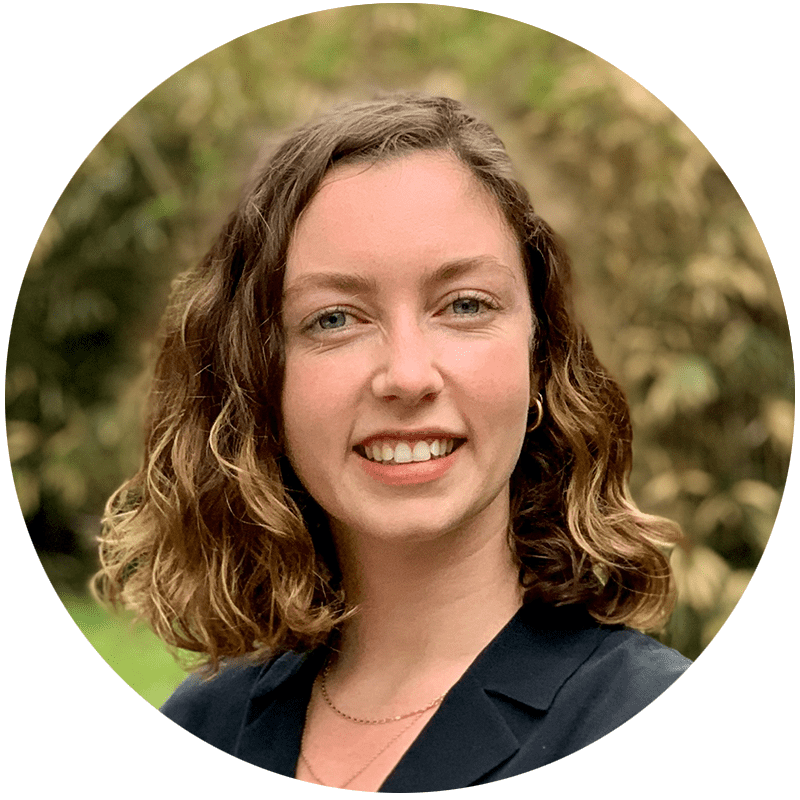
Bailey Clark served as the Communications Coordinator for World Relief Memphis. With a background in journalism and advertising, she is passionate about storytelling and its power to make a difference.

A pioneer in the documentation space, Emily Kankindi is the communications and documentation unit coordinator at World Relief in Rwanda. She started with World Relief in 2005 and has been growing through different stages while pursuing a career in creative communications with a passion to tell the story of impact. Driven by a mission to serve the most vulnerable, Emily is best known for inspiring others to care and serve the needy by using all possible means of communication to promote and call forth positive ramifications of WR interventions in all aspects of life. Her educational background is marketing and travel operations.
Compassion & Advocacy
by Hunter West //
Last December I took a trip to the U.S.-Mexico border, led by Abara, a nonprofit faith-based organization, alongside pastors and ministry leaders from around the country. There, I gained a first-hand look at an issue often found in our news headlines.
However, headlines often do not give the fullest sense of the issues that plague the southern border. Oftentimes we hear of the border being an issue of national security though these problems go beyond security conflicts. There is an abundance of humanitarian issues that must be addressed as well.
During our trip we discussed the complexities of immigration policy. Questions arose as to how we can have a compassionate and just response to a family of undocumented parents and documented children. We talked to border patrol agents about how they are overworked and underappreciated. (The attrition rate of border patrol agents is twice that of other federal agencies.) We also learned that a broken immigration system leads to even more broken lives as between 14,500 to 17,000 individuals are trafficked into the United States each year.
However, the most memorable portion of the trip was visiting El Buen Samaritano, a migrant shelter in Ciudad Juarez, Mexico. As one of the 23 shelters in the city, it offers a place of rest and restoration for weary travelers who typically stay an average of two weeks to two months waiting for their asylum requests to be processed. It also is one of many shelters run by a church, showing that Christians are on the frontlines of the issue at the border, offering our immigrant neighbors physical and spiritual nourishment in such a desperate time of need.
As my group pulled up to a faded blue stucco building, we were met by numerous women and children who warmly greeted us with gentle smiles and soft holas.
Most of my visit was spent talking to a young girl who took a journey from southern Mexico along with her brother and mother. She is unaware of the location of her father. She is 17, uses Duolingo to learn English, loves Harry Styles, and wants to be a kindergarten teacher. With her English better than my Spanish, we talked for an hour about typical teenage-level things, like pop singers who have weird styles. Yet even if the conversation lacked depth, the interaction did not.
While stereotypical descriptions of people approaching the border may cast them as drug traffickers or individuals determined to break U.S. law, neither my new friend nor the other residents I met at El Buen Samaritano resembled that caricature. The details of their stories may differ, but all of them were seeking a legitimate way to enter the United States and build something good for their families as part of a safe community.
Neither a border nor media-induced stereotypes of asylum seekers; neither a physical wall nor a language barrier could overshadow the truth that this girl is made in the image of God and is, therefore, worth protecting. This is a young girl who is no mere mortal but someone who has a soul, who was knitted together in her mother’s womb, who has the potential to create. This is a girl who is eager to flee the poverty of her hometown and connect with her cousin in the U.S. so she can finish her schooling and teach one day.
As she was filled with the hope of what life could be like in the United States, I was filled with sadness over the struggles she will likely face as an asylum seeker. I knew she would have to show a credible fear of persecution to request asylum as poverty alone would not be enough to gain asylum approval. Further, even if that request should be processed, she would face a significantly backlogged immigration court – on average, expected immigration hearing wait times are now 1,572 days (4.3 years). Title 42 also poses an issue as it would allow her to be turned back for public health concerns. She could also encounter metering, a practice that has been in place for a while now (where asylum seekers may be forced to wait in Mexico as their asylum request is being processed).
In other words, my new friend would encounter a broken system where legal immigration is not as straightforward a process as it could and should be.
Before I left the shelter, I gave her a big hug, feeling frustrated with living in a fallen world and not having any power in my own strength over it. It is not God’s heart that this young girl should continue to live in impoverished limbo and be vulnerable to exploitation.
I also think of Jesus, the holy Son of God who took on flesh and made himself vulnerable to exploitation by the very ones he came to save (Romans 5:7-8). Christ’s incarnation took place because it was not the heart of God that we should live subjected to our world, our flesh, and the devil. Therefore, the Father sent Jesus to not only live, die, and defeat death for us – but he also is currently advocating for us before the holy God (1 John 2:1). So yes, Jesus came to save us but he also calls us to discipleship, living as he lived and lives (1 John 2:6).
Instead of balking at our brokenness and forsaking us to fend for ourselves, Jesus moves toward us in compassion and willingly becomes our advocate.
Similarly, may we not forsake the thousands of individuals coming to the southern border, considering them a national security issue. Rather may we move toward them in compassion, ready to receive them. Further, may we consider stepping into the opportunity of advocacy by praying for our elected officials and immigrant image-bearers, speaking out to our legislators and voicing our support for the individuals coming to the southern border.
And as you do, remember my friend from El Buen Samaritano. Remember we can advocate for people like her only because we have a Savior advocating for us.
Join us in advocacy by signing on to this letter.
Originally from Kinston, NC, Hunter West is the Advocacy Coordinator at World Relief Durham. She works to equip and empower congregations across the state of North Carolina to understand God’s call throughout scripture to welcome the stranger, to identify practical ways to serve immigrants in their communities, and to speak out with and for vulnerable immigrants.
7 Ways to Love Your Neighbor
In Rwanda we have a saying — “Ifuni ibagara ubucuti ni akarenge.” This literally means, “a hoe that cultivates friendship is a foot.” In other words, we love our neighbor by visiting them and helping if they need anything.
No matter where you live, loving your neighbor is an integral part of our call as Christians. Having served alongside local churches in Memphis and Rwanda, we have seen first-hand how loving your neighbor comes in all shapes and sizes.
In some places, loving your neighbor might mean sharing baked goods. In another, it may mean dropping by unannounced for an afternoon tea. And still, for others it could mean fetching water or making bricks for a neighbor who is building a house. Yet, no matter where you live, one thing remains the same: We love because God first loved us. That’s why today, we’re sharing 7 Ways to Love Your Neighbor.
1. Take the Initiative and Value Small Acts of Kindness
Helping one another without being asked to do so is part of the culture in Rwanda. And doing something for your neighbor does not always require much. If your neighbor is sick, you could visit them, deliver groceries to them or take them to the doctor when necessary.
In rural Africa, if a neighbor is building a house, you could lend a hand by fetching water for them, making bricks or finding wood. In short, loving your neighbor is in action more than words.
2. Spend time
Quality time is said to be one of the five major ways people experience love. That’s true no matter who you are or where you’re from. When refugee families first arrive in the U.S., many often feel isolated with no family, no community and no means of transportation. Even if there is a language barrier, the simple act of spending time with our neighbors can make a world of difference. Whether you pop in for a tea or a walk, just knowing that someone cares and that they are not alone allows refugee families to feel the love of Christ through our actions.
3. Share a meal
Sharing a meal is perhaps one of the best ways to show our love for our neighbors. Whether it’s at your home or theirs, breaking bread together meets not only a physical need but also the mental and spiritual need for relationship.
No matter where you live, meals are an opportunity to connect, sharing our own culture while experiencing someone else’s. Especially for many refugees rebuilding their lives in the U.S., sharing a meal also demonstrates respect and interest in their life and culture, something that may often be overlooked in their new home.
4. Foster Reconciliation
Loving your neighbor can encompass more than lending a hand. It’s also reconciling relationships. In some Rwandan communities, church members often disregarded people from other denominations, sometimes to the point of viewing them as non-believers and refusing to work together.
After being trained by World Relief, church leaders, volunteers and program participants are reaching across denominational lines to adopt a culture of loving their neighbor by acting together. They’ve realized that together, as a unified body, they can accomplish much more, and they’re seeing ripple effects of love, joy, peace and harmony across whole communities.
Ask yourself — is there someone I can love by moving toward reconciliation and forgiveness? Is there someone I disagree with politically or denominationally that I can build a connection and a friendship with?
5. Listen
Paying close attention and listening to what your neighbors are saying is so important. We may have had very different upbringings and viewpoints, but we are all made in the image of God, and each of us has a story to tell. By listening to that story, we’ll learn new ways in which we can be intentional with our neighbors, showing them that they are welcomed and loved.
6. Advocate
While loving our neighbors on an interpersonal level is who we are called by Christ to be, sometimes systemic injustice is at the root of a problem, and loving our neighbor means advocating with them as well.
Advocacy is speaking up with those who are vulnerable to address the underlying causes of injustice by influencing the policies and practices of people in power. By starting with the reality of “what is,” we can leverage our voices to make systemic changes that lead to a vision of “what should be.”
7. Go Together
At World Relief, we believe we can accomplish so much more when we go together. In the U.S., our church partners form Good Neighbor Teams who work together to welcome and serve their new immigrant neighbors by taking them to appointments, picking up groceries or fostering friendships over lunch or dinner.
In places like Rwanda and Haiti, Outreach Group volunteers pair up to visit the homes of struggling families. Outreach Groups give local churches the opportunity to intentionally engage the community in a consistent way at a wide scale. Ordinary church members are equipped to do what Jesus taught and did — reaching out to their neighbors to share messages that lead to holistic development and facilitate relationships.
If you’re considering reaching out to a neighbor or participating in a service project, why not ask someone to join you, so this movement of love can grow further?
Living justly and loving our neighbor is better when we do it together. Share this article with a friend and invite them to join you in loving your neighbors this week.

Bailey Clark serves as the Communications Coordinator for World Relief Memphis. With a background in journalism and advertising, she is passionate about storytelling and its power to make a difference.

A pioneer in the documentation space, Emily Kankindi is the communications and documentation unit coordinator at World Relief in Rwanda. She started with World Relief in 2005 and has been growing through different stages while pursuing a career in creative communications with a passion to tell the story of impact. Driven by a mission to serve the most vulnerable, Emily is best known for inspiring others to care and serve the needy by using all possible means of communication to promote and call forth positive ramifications of WR interventions in all aspects of life. Her educational background is marketing and travel operations.
What does a year hold?
When I consider the new year, I’m struck by how little we know about what it will hold. In 2019, we had no idea that the pandemic would shut down the world in 2020. Before 2020, we had no idea that Afghanistan would fall in 2021. In 2021, we had no idea that Ukraine would be invaded in 2022. As we face 2023, we have no idea what might lie ahead.
Beyond these more public events, it is an unfortunate truth that the world is riddled with conflict, poverty, corruption, and environmental realities that have been driving people from their homes for generations. The People of Myanmar, Venezuela, Darfur, Iran, Eritrea, and other places are forced daily to display a resilience many of us will never know.
So, what do we do with these realities?
What do we do with the certainty we can’t know the future and the heart-breaking crisis of mass displacement? It can be overwhelming and we can find ourselves focusing on what we do not know. In these moments I ask myself, “Who am I becoming?” “How will I lean into trusting God this year?” “How can I be a person of faith in the year ahead?”. Questions more easily asked than answered.
But in my life, I have found that amid uncertain futures, it is vital that we hold to our core values. It is vital that we lean into learning to trust God and others. When tethered to truth, we can navigate the uncertainties ahead with grace, confidence, and hope. When bound to one another, we can endure challenges, create lasting solutions, and make the world a better place.
Values We Hold
All people have sacred worth.
For those of us who follow Jesus, we believe that every person is created in the image of God and worthy of welcome. There are no qualifiers here. As a popular quote from an unknown author says “You will never look in the eyes of a person that God does not love.” This means that every person who comes to the US is someone God loves. Every immigrant, refugee, or asylum seeker has unspeakable value and potential. To not extend welcome is to dishonor the image of God in them.
We are made for connection.
John Donne’s poem “No man (or woman) is an island” captures this reality beautifully. We are not made for isolation. Each of us is a part of something bigger. Each of us has a part to play in this world. We are designed to be together. This means at least two things. First, the work of welcoming immigrants is something we do together, relying on each other’s strengths and resilience. And second, building relationships with those around us, immigrants and native-born alike, is sacred work. When we build relationships with one another that are meaningful and mutually transformative, we are participating in a broader multigenerational journey toward a more just world.
We are more powerful together.
My first encounter with the work of World Relief was as a volunteer. I remember a wide range of emotions when I started. Hopeful, eager, anxious, overwhelmed, grateful . . . the list could go on. But one thing that jumps out to me from that time is how much of an impact the whole community of World Relief was having. Sure, I was giving a few hours a week. But alongside others, we were giving so much more. Over my years serving and leading here, I have seen the power of a community to make lasting change. One example of this is a recent study showing how more evangelical Christians are now looking to scripture for their views on immigration, an area of concerted advocacy work for World Relief. We can create something far more beautiful than we can on our own, together.
We All Have a Part to Play
When we hold space for these values to form us, I believe we will find ourselves ready for the year ahead. In the midst of economic uncertainty and a longer-then-we-would-like pandemic recovery, we remain ready to welcome.
In 2023, I anticipate discovering new challenges and witnessing new successes. I embrace the reality that I can’t know the future. I hold to the truth that no matter what comes, we are not alone. We have hope, and we will continue to serve as we have over the past 43 years. I am grateful beyond words for you and the whole World Relief community. And I know that together, we will continue to embody welcome, provide vital services for immigrants, and create a community we can all be grateful for.
Find Your Part to Play
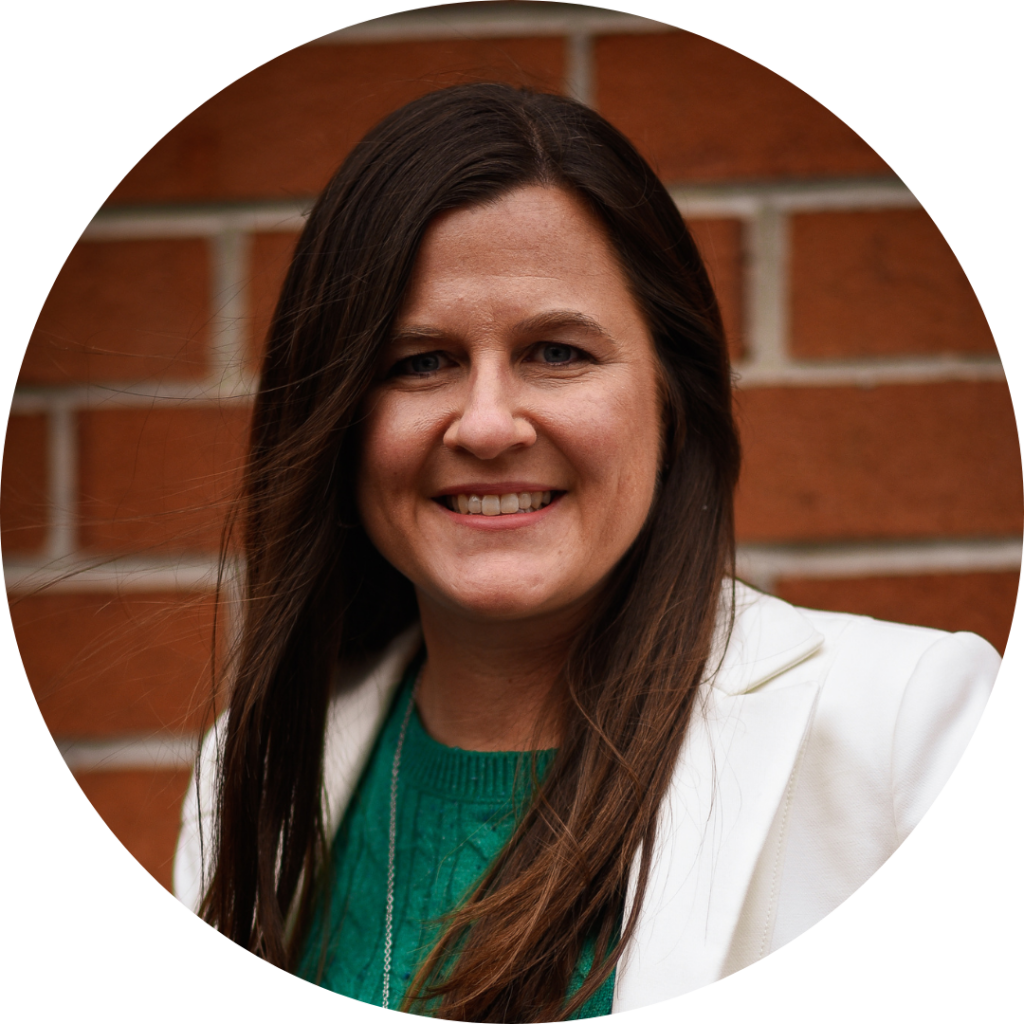
Susan Sperry is the Executive Director of World Relief Chicagoland, a faith-based organization committed to empowering the church and community to serve immigrants in vulnerable situations. She leads World Relief’s three locations in Chicago, DuPage County, and Aurora to provide vital services, bring people together, and build welcoming communities. Susan has served at World Relief since 2001, facilitating the resettlement of thousands of refugees and mobilizing hundreds of volunteers and churches to serve their neighbors. She has her MS in Learning and Organizational Change from Northwestern University, and her undergraduate degree from Wheaton College. She loves working alongside teams to navigate the human side of change and aspires to be a life-long learner.
Healing For the Nations
Hope, peace, love, & joy. The Advent season is a time for us to hold these things in the tension in which we find ourselves. Christ has come and Christ will come again. Scripture provides vivid pictures of how God’s goodness and life is all around us at every moment. He also promises us a reality yet to be fulfilled. This truth tends to meet us all a bit differently in light of what we have come through and what we anticipate in our future.
As we live in community with our refugee and immigrant neighbors, we see this firsthand. The urgency of waiting. The grasping of hope, striving for peace, longing for love, searching for joy. For each of us, these things feel slightly, or perhaps greatly, different. So how can we wait together in eager expectation?
In the beginning of time, God ordered his creation out of the chaotic waters and placed a garden. Eden, where humanity was born. There was a tree of life in its center that was an assurance of God’s abiding presence. In Genesis 2 we see that “a river went out from Eden to water the garden” [v.10] and from there it flowed out into the surrounding lands, bringing life everywhere it ran. God’s presence was creating and sustaining life. Like a river, his life is powerful, vibrant, and perpetual. In every way that God is moving, death becomes life and lack becomes bounty.
The prophet Ezekiel paints a similar picture when he is given a vision of God’s temple in Ezekiel 47:1-12. He describes a river flowing from the temple where God’s presence dwelt among the people, saying, “on the banks, on both sides of the river, there will grow all kinds of trees for food. Their leaves will not wither, nor their fruit fail, but they will bear fresh fruit every month, because the water for them flows from the sanctuary. Their fruit will be for food, and their leaves for healing.” [v.12] Once again, God is with us, bringing life!
In the book of John, we meet Jesus. And in John 4, Jesus meets a woman by a well. There, he declares to her and to us that “whoever drinks of the water that I will give him will never be thirsty again. The water that I will give him will become in him a spring of water welling up to eternal life.” [v.14]. Throughout his life, Jesus brought healing and restoration everywhere he went. He is our living water, as evidenced by the water that flowed from his side at Calvary when he became our redeemer, fulfilling all the law and prophets.
This thread, woven through the story of God, culminates in a vision of the New Creation:
“Then the angel showed me the river of the water of life, bright as crystal, flowing from the throne of God and of the Lamb through the middle of the street of the city; also, on either side of the river, the tree of life with its twelve kinds of fruit, yielding its fruit each month. The leaves of the tree were for the healing of the nations. No longer will there be anything accursed, but the throne of God and of the Lamb will be in it, and his servants will worship him. They will see his face, and his name will be on their foreheads. And night will be no more. They will need no light of lamp or sun, for the Lord God will be their light, and they will reign forever and ever.“
-Revelation 22:1-5 [Emphasis added]
Takeaways this Advent season…
This Advent, we are turning our hearts once again toward the great hope that has come into the world. As Revelation 22 tells us, we will once again see God’s presence bring life to us like a rushing river. This is the source of hope, peace, love, joy, and life that powers our love for our neighbors and our desire to see us all transformed together. Though our weariness comes in different forms, our restoration comes in one form—the Savior, who is Christ the Lord. So we, along with every tribe and tongue and nation, can celebrate the coming of our King, the river of eternal life, the vine whose leaves provide our healing.
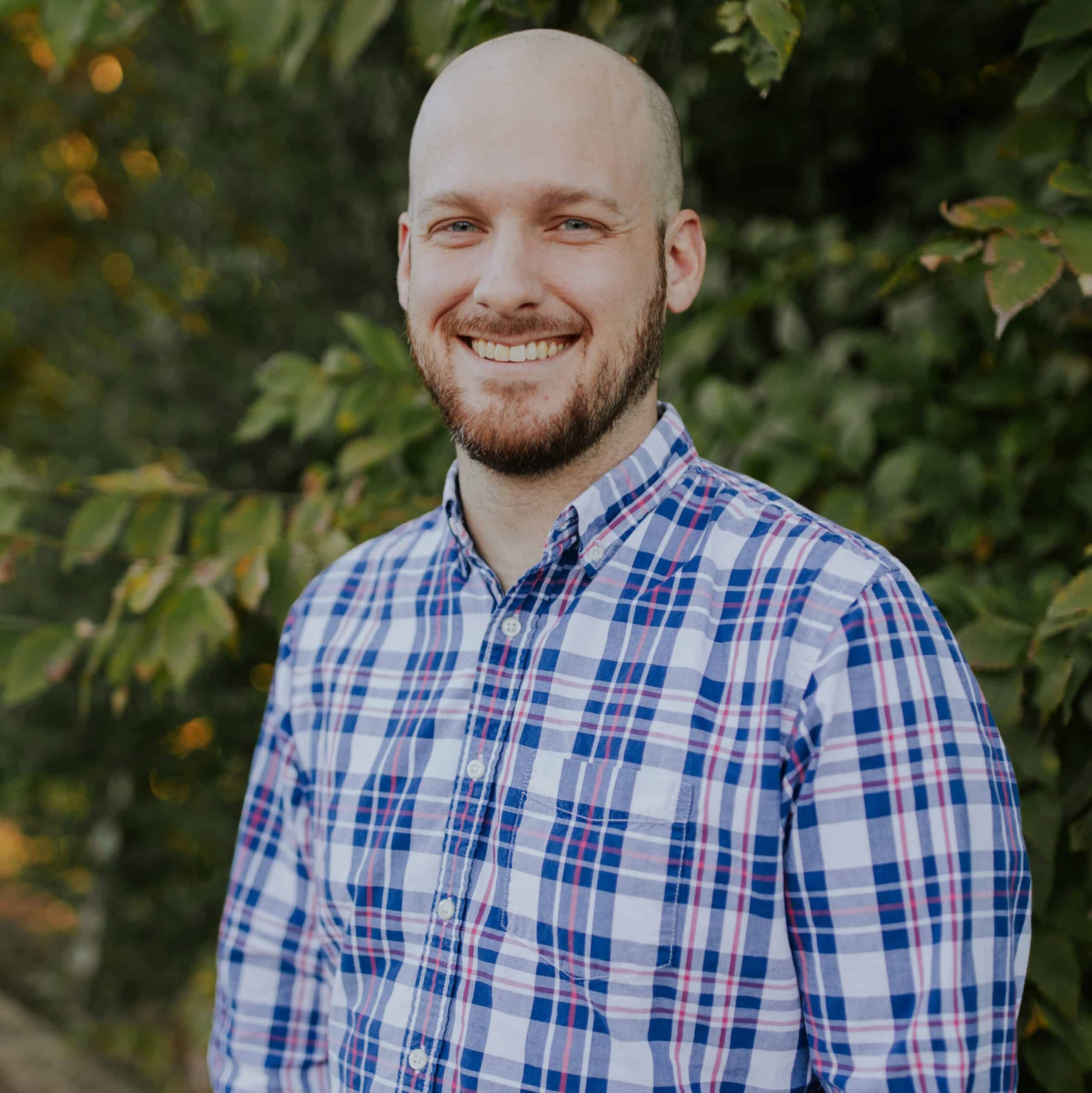
Writer: Carter Brinkley
Volunteer Coordinator at World Relief Memphis
If you would like to learn more about World Relief Memphis in the coming months, follow us on social media! Also, sign up for our newsletter to stay up to date on events and volunteer opportunities.
If you are searching for an opportunity to begin making a bigger impact, join our new monthly giving program, The Path, for exclusive updates, virtual events, prayer chains. You will also see stories of hope from the women, men, and children whose lives you change.
Breaking Down Barriers: How Autism Has Helped Me Serve My Refugee Neighbors
I’ve lived in the same place my whole life. I have never had to leave everything I know out of fear for my life. In many ways, my life and the lives of my refugee and immigrant neighbors couldn’t be more different.
Yet, I do know what it feels like to be on the outside looking in. For as long as I can remember, I have felt somewhat out of place, like I wasn’t meant for this world in some way. I didn’t know the reason for this — it was just the way I was.
It wasn’t until I was 20 years old that I finally realized why I felt so out of place. That’s when I first heard, “You have autism.”
On one hand, I was relieved. I finally had an answer for why I felt like a person who was told to play the game without being given the rules. On the other hand, it expanded my understanding of just how much our society is not built to accommodate people like me.
Fighting the battles that come along with having autism has been difficult, but it’s also afforded me a unique love for learning from those whom society often relegates to the margins. Over the years, this has meant seeking to be mentored by African American pastors, working with the imprisoned and searching out opportunities to see how my Christian faith intersects with building up my local community.
In college, I was introduced to this type of ministry when I had the opportunity to work with refugees as an ESL tutor. For me, this felt like a natural extension of my passion for reflecting God’s love to those on the margins. Years later, through God’s providence, I was given the opportunity to continue serving refugees when I joined the World Relief Upstate SC team right here in my own community in South Carolina.
Now, in my role as the Upstate SC Mobilization and Development Coordinator (and formerly as the Church and Volunteer Engagement Coordinator), my life is full of paradoxes. I am a person who struggles with social interactions, but I must frequently speak to volunteers, churches and other community partners about how we are called to love and serve refugees. Accepting unpredictability and ambiguity does not come naturally to me, yet refugee resettlement is anything but predictable.
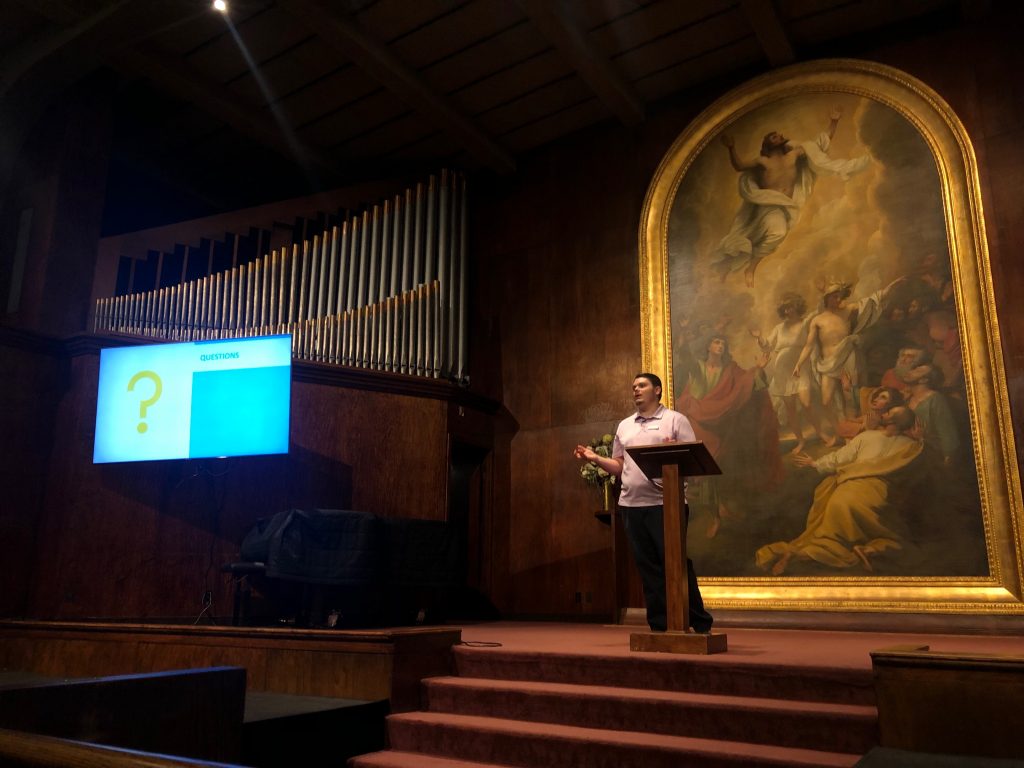
While these are paradoxes, they show that God uses every single person to advance his cause and that his kingdom breaks down barriers of gender, race, ethnicity and even disability. In fact, because of my disability, I believe it can sometimes be easier for me to put myself in the shoes of refugees and immigrants who are feeling out of place and lost in a culture and society that wasn’t built for them.
For many refugees and immigrants, navigating new communities, grocery stores, school systems, workplaces and more can feel like trying to put a puzzle together without knowing what the finished product should look like. That’s a feeling I can certainly relate to.
My experience with autism spectrum disorder also gives me compassion for the fear and uncertainty that many of our refugee and immigrant neighbors face in their daily lives. I understand what it means to cling to Matthew 6:34, which says “do not worry about tomorrow, because tomorrow will worry about itself.”
While I do not discount the many challenges people like me face or the differences between my experience and that of refugees, I do believe wholeheartedly that the good news of God transforms even the most difficult of situations for our good and his glory.
At World Relief, I’ve found a place where I can work within my strengths and limitations as someone who has autism and experience God’s transformation in my life and in the lives of those around me.
World Relief is committed to building welcoming communities that value and accept refugees and immigrants. That same culture has helped me feel valued and accepted. Our Office Director, Brandon Baughn, has been an especially faithful example of this culture of welcome, giving me the blessing of trust in my work and in my perspective not only as someone with autism, but more importantly, as a follower of Christ who is passionate about serving “the least of these.”
This trust has allowed me to run headlong into serving churches and volunteers so that they, too, can create communities of welcome. I am able to do my work knowing that World Relief welcomes my unique perspective and does not see my disability as a hindrance.
Together, we are moving towards creating spaces where people of all nations, backgrounds and abilities can embrace their God-given purpose and live out their full potential.
At World Relief, we are grateful for faithful staff like Austin. We rely on the time, talents and treasure of people like you to continue moving forward together. You can join us by giving today or by checking out our careers page to see if working at World Relief is a good fit for you.

Austin Donahoo is the Mobilization Development Coordinator at World Relief Upstate SC, where he previously served as the Church and Volunteer Engagement Coordinator. He loves integrating his passions for Christian ministry and theology with community engagement, believing that the call of the gospel is to be shown in both word and deed. At World Relief, he works to do this by equipping churches and volunteers to love their refugee and immigrant neighbors.








